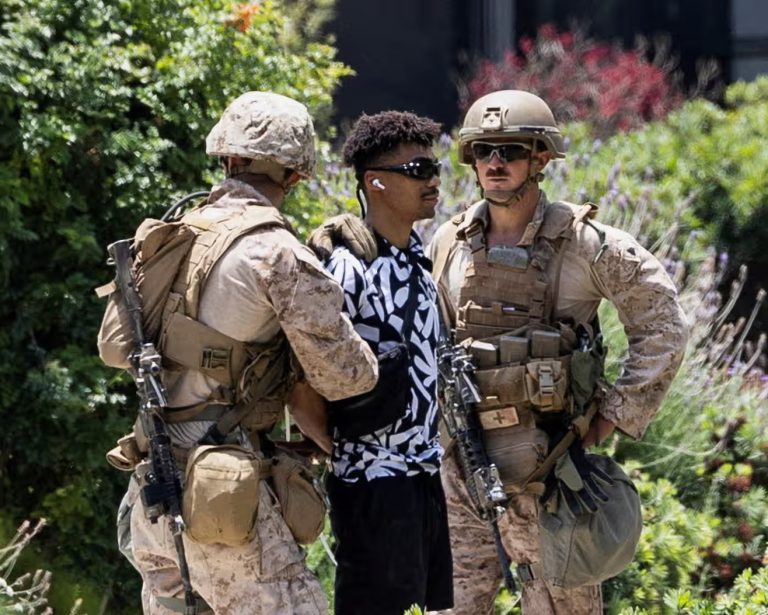US Marines Temporarily Detain Civilian in Los Angeles Following Trump-Ordered Deployment
US Marines deployed to Los Angeles on Friday briefly detained a civilian, the US military confirmed—marking the first known instance of active-duty troops detaining an individual since President Donald Trump ordered the military into the city.
Earlier that day, Marines had assumed control of the Wilshire Federal Building in a rare domestic deployment, following days of protests over immigration raids. Photos captured by Reuters showed Marines restraining a man with zip ties before handing him over to personnel from the Department of Homeland Security.
A spokesperson for US Northern Command stated that active-duty forces may “temporarily detain an individual in specific circumstances” and must transfer custody to civilian law enforcement as soon as it is safe to do so.
Roughly 200 Marines arrived in Los Angeles Friday morning as part of Trump’s controversial deployment of federal forces. The move, made over the objections of California Governor Gavin Newsom, followed ongoing unrest and curfews in parts of downtown LA during a week of protests.
The detained civilian, 27-year-old Marcos Leao—an Army veteran and naturalized US citizen—told reporters he was on his way to the Department of Veterans Affairs when he inadvertently crossed a taped-off area and was asked to stop. Leao said he was treated “very fairly,” adding: “They’re just doing their job.”
Protests have spread nationwide in recent days, with demonstrations taking place in New York, Chicago, Seattle, and Austin. Saturday is expected to see mass rallies at around 2,000 sites across the country under the banner “No Kings,” opposing what critics see as Trump’s authoritarian tendencies.
The demonstrations are timed to coincide with Trump’s military parade in Washington DC, marking the 250th anniversary of the US Army—and the president’s 79th birthday. Critics argue the event, featuring tanks, aircraft, and 6,600 soldiers, is more about Trump’s image than national unity. Organizers of the “No Kings” protest say they deliberately avoided staging a rally in Washington to draw focus away from the spectacle.
Governor Newsom has initiated legal action to stop the deployment. On Thursday, a federal judge ruled that Trump had overstepped his authority by sending troops without following congressional protocols. The administration appealed, and a higher court has paused the ruling until a hearing scheduled for Tuesday.
Newsom criticized Trump in an interview with the New York Times, calling him a “stone cold liar” for claiming they had coordinated the deployment by phone. Democrats and civil liberties groups have called the move an overreach aimed at suppressing dissent and bolstering Trump’s hardline immigration agenda.
The military deployment has also raised concerns within the armed forces. Some National Guard members and their families have expressed unease, saying their presence in Los Angeles feels like political involvement.
“The sentiment across the board is that deploying military force against our own communities isn’t what we signed up for,” said Sarah Streyder of the Secure Families Initiative. Chris Purdy of the Chamberlain Network echoed this, noting that morale among troops is reportedly low.
While widespread looting appears to have subsided, arrests related to the protests continue. In one case, Jose Manuel Mojica, 30, was charged with assaulting a federal officer during a demonstration in Paramount, southern Los Angeles County.
Tensions further escalated Thursday when Democratic Senator Alex Padilla was forcibly removed and handcuffed at a press conference held by Homeland Security Secretary Kristi Noem. Video of the incident, which has since gone viral, shows Padilla being restrained by Secret Service and FBI agents after attempting to ask a question. He later warned that his treatment reflected broader concerns about civil liberties under the Trump administration.
Republican lawmakers were divided on Padilla’s removal, with most defending it and some condemning the action. Democrats widely supported Padilla and denounced the use of force.
As protests intensify and legal challenges unfold, the clash between federal authority and state leadership is shaping up to be a defining confrontation over civil rights, immigration enforcement, and the role of the military in domestic affairs.

